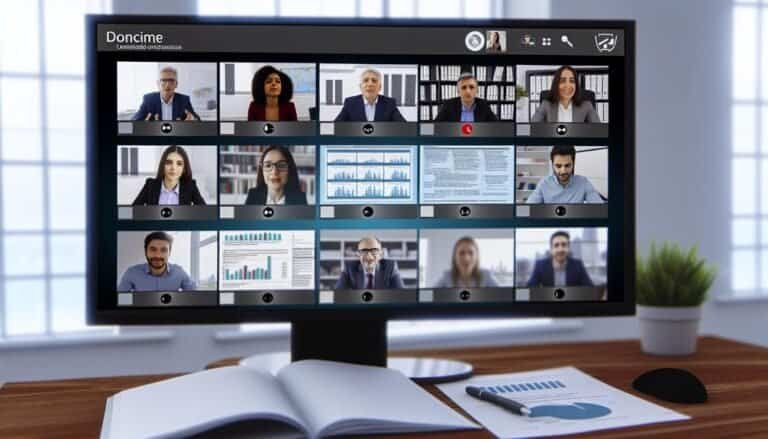Are Robots Taking Over? Debunking Myths About Ai And Unemployment”
Are robots really taking over and causing mass unemployment? This question has sparked much debate and fear in recent years as advancements in AI and automation continue to reshape the workforce. However, it is important to debunk the myths surrounding this topic and gain a deeper understanding of the true impact of AI on employment.
In this article, we will explore the advancements in AI and automation that have led to concerns about job displacement. We will delve into the various job opportunities that have emerged in the AI era, highlighting how humans can work alongside machines rather than being replaced by them.
By analyzing these facts objectively, we aim to provide a comprehensive view of the future of work in an increasingly automated world. So let’s dive in and separate fact from fiction when it comes to robots taking over!
Key Takeaways
- Advancements in AI and automation do reshape the workforce, but the fear of robots taking over and causing mass unemployment is a myth.
- AI and automation actually make jobs more efficient and free up time for more meaningful work, allowing employees to focus on higher-level responsibilities like problem-solving and creative thinking.
- While some jobs may be automated, new roles will emerge in response, and technological advancements historically create new job opportunities.
- Industries like e-commerce, logistics, online customer service, data science, autonomous vehicles, healthcare technology, and VR/AR are growing in the AI era, providing new job opportunities for professionals who can analyze and interpret data and adapt to the changing landscape.
The Impact of AI and Automation on Employment
Don’t worry, AI and automation aren’t stealing your jobs, they’re just making them more efficient and freeing you up for more meaningful work. The fear of robots taking over our jobs is a common misconception fueled by sensationalized media headlines.
While it is true that AI has the potential to automate certain tasks traditionally performed by humans, this does not necessarily lead to widespread unemployment. In fact, history has shown that technological advancements have consistently created new job opportunities.
AI and job displacement are often mentioned together, suggesting that as AI becomes more advanced, human workers will be replaced by machines. However, studies have shown that while some jobs may be automated or eliminated entirely, new roles will emerge in response to these changes.
For example, the rise of e-commerce led to the decline of brick-and-mortar retail jobs but created a demand for positions in logistics and online customer service. Similarly, as AI takes over repetitive and mundane tasks, employees can focus on higher-level responsibilities such as problem-solving and creative thinking.
Another concern related to AI is income inequality. Some argue that automation will widen the gap between high-skilled workers who benefit from AI technology and low-skilled workers who face job displacement. While it is true that certain industries may experience disruption due to automation, this doesn’t necessarily translate into increased income inequality across all sectors of the economy.
In fact, studies suggest that businesses adopting AI technologies tend to become more productive overall, leading to economic growth and potentially higher wages for employees.
The impact of AI and automation on employment should not be feared but rather embraced with cautious optimism. Instead of stealing jobs outright, these technologies are transforming work processes and allowing individuals to focus on more meaningful tasks. While some roles may be automated or evolve over time, new job opportunities will arise in response to these changes.
As we navigate this era of technological advancement hand in hand with AI systems, it’s important to foster a society where everyone can benefit from these developments, minimizing income inequality and ensuring a prosperous future for all.
Advancements in AI and Automation
Embrace the irony of technological progress, as AI and automation continue to evolve at a staggering pace. These advancements bring with them ethical implications that we must carefully consider.
One area where AI is making significant strides is in healthcare. The use of AI in medical diagnosis and treatment has the potential to greatly improve patient outcomes and reduce human error.
AI in healthcare has the ability to analyze vast amounts of patient data, identifying patterns and predicting potential health issues before they become severe. This can lead to earlier interventions and more personalized treatment plans for patients. AI-powered algorithms can also assist doctors in making accurate diagnoses by comparing symptoms to a vast database of medical knowledge.
However, the ethical implications of relying heavily on AI in healthcare cannot be ignored. Trusting machines with decisions that directly impact human lives raises concerns about accountability and responsibility. There is also the risk of reliance on technology leading to a dehumanization of healthcare, with less emphasis on personal interaction between doctors and patients.
As advancements in AI continue, its integration into healthcare holds great promise for improving patient care. However, we must also carefully consider the ethical implications that arise from relying heavily on machines for such critical decisions. Striking a balance between embracing technological progress while maintaining human values is key to ensuring that AI enhances our lives without overshadowing our humanity.
Job Opportunities in the AI Era
In the AI era, job opportunities are emerging in new industries as the technology continues to evolve.
It is important for individuals to prioritize reskilling and adaptability in order to thrive in this rapidly changing landscape.
By staying updated with the latest advancements and acquiring new skills, you can position yourself for success in the AI-driven workforce.
The Emergence of New Industries
Explore the exciting possibilities of new industries emerging with the advancement of AI technology. As artificial intelligence continues to develop and become more integrated into our daily lives, it opens up a whole new world of job opportunities and economic growth.
Here are four examples of how AI is driving the emergence of new industries:
-
Data Science: With the vast amount of data being generated every day, there’s a growing need for professionals who can analyze and make sense of this information. AI algorithms can help process and interpret data, enabling companies to make better decisions and gain valuable insights. This has led to an increased demand for data scientists who possess both technical skills in AI and analytical capabilities.
-
Autonomous Vehicles: The rise of self-driving cars is revolutionizing the transportation industry. AI technology plays a crucial role in enabling these vehicles to navigate roads, detect obstacles, and make real-time decisions. As autonomous vehicles become more prevalent, there’ll be a surge in job opportunities related to their development, maintenance, and regulation.
-
Healthcare Technology: AI has tremendous potential in transforming healthcare by improving diagnostics, drug discovery, patient care, and administrative tasks. Machine learning algorithms can analyze medical records and images to aid doctors in making accurate diagnoses or predict disease outcomes. Additionally, robotics powered by AI can assist surgeons during complex procedures. These advancements not only enhance patient care but also create jobs in areas such as medical research, health informatics, and telemedicine.
-
Virtual Reality (VR) & Augmented Reality (AR): The combination of AI with VR/AR technology creates immersive experiences across various industries like gaming, entertainment, education, training simulations, marketing campaigns, architecture/design visualization—to name just a few examples! As businesses recognize the potential that VR/AR brings in terms of customer engagement and interaction, they’re increasingly investing in these technologies which paves the way for new job creation.
These are just some examples showcasing how AI is driving new job creation and fostering economic growth. As the technology evolves, we can expect even more industries to emerge, creating a wealth of opportunities for individuals with AI expertise. So, embrace the advancements in AI and explore the exciting possibilities that lie ahead!
The Importance of Reskilling and Adaptability
Adapting to new technologies and acquiring new skills is like navigating through a winding maze of opportunities, where the path to success requires continuous learning and reskilling. In today’s rapidly changing world, the importance of reskilling and adaptability can’t be overstated.
As automation and artificial intelligence (AI) continue to advance, certain jobs may become obsolete or undergo significant transformations. This presents reskilling challenges for individuals who need to stay relevant in the job market.
To tackle these challenges, it’s crucial for workers to embrace adaptability strategies. One key strategy is to have a growth mindset – the belief that abilities can be developed through dedication and hard work. By adopting a growth mindset, individuals are more likely to view new technologies as opportunities rather than threats. They can approach reskilling with enthusiasm and actively seek out training programs or educational resources that’ll help them acquire the necessary skills for emerging industries.
Furthermore, fostering a culture of lifelong learning within organizations is essential. Employers should encourage their workforce to continuously update their skills through training programs and provide support for professional development. Investing in employees’ reskilling not only benefits individuals but also enhances overall productivity and innovation within the organization.
Adapting to new technologies requires individuals to navigate through a maze of opportunities by continuously learning and reskilling. Reskilling challenges can be overcome by embracing adaptability strategies such as having a growth mindset and fostering a culture of lifelong learning within organizations. By staying proactive in acquiring new skills, individuals can position themselves for success in an ever-evolving job market influenced by AI and automation.
The Future of Work
Don’t worry, you might be surprised to learn that the future of work is not as bleak as it seems – according to a study by McKinsey, only 5% of jobs can be fully automated with current technology.
While technological advancements continue to reshape the job market, they also create new opportunities for workers. Automation and artificial intelligence (AI) are more likely to augment human capabilities rather than replace them entirely. As machines take over repetitive and mundane tasks, humans will have the chance to focus on more complex and creative work.
The future job market will require individuals to adapt and reskill themselves continuously. As automation takes over routine tasks, there will be a growing demand for skills that are uniquely human – critical thinking, creativity, emotional intelligence, and problem-solving. These skills cannot be easily replicated by machines and will become increasingly valuable in the workplace. Therefore, instead of fearing unemployment due to automation, individuals should embrace lifelong learning and invest in developing these essential skills.
Technological advancements have historically led to job displacement but have also created new industries and employment opportunities. This pattern is expected to continue in the future as well. While some jobs may become obsolete due to automation, new roles will emerge that we cannot yet imagine. For example, AI will require human oversight, maintenance, and decision-making. Additionally, industries such as cybersecurity and data analysis are experiencing rapid growth due to advancements in technology. Therefore, it is crucial for individuals to stay adaptable and open-minded towards emerging industries and technologies.
Overall, although concerns about robots taking over jobs persist in popular discourse today’s reality is less alarming than it seems at first glance. Only a small fraction of jobs can currently be fully automated with existing technology. The future job market will prioritize uniquely human skills that cannot be easily replaced by machines or AI algorithms alone.
Technological advancements may displace certain roles but simultaneously create new areas of employment that we cannot predict yet accurately fully anticipate or foresee. By embracing lifelong learning and staying adaptable, individuals can navigate the changing world of work and thrive in the future.
Harnessing the Benefits of AI and Automation
In this discussion, you’ll explore the key points of enhancing productivity and efficiency through AI and automation. You’ll also examine the importance of ensuring ethical and responsible use of AI.
By harnessing the benefits of AI and automation, industries can streamline processes, reduce errors, and increase output. However, it’s crucial to implement policies that prioritize the ethical development and use of AI systems to avoid potential negative impacts on society.
Enhancing Productivity and Efficiency
Maximizing productivity and efficiency can be achieved by utilizing the capabilities of robots and AI. These technologies have the potential to revolutionize industries by streamlining processes, reducing errors, and increasing output. Here are three ways in which robots and AI can help in enhancing productivity and efficiency:
-
Automation: Robots and AI systems can automate repetitive tasks that consume a significant amount of time for human workers. By taking over these mundane tasks, employees can focus on more complex and creative aspects of their jobs, leading to increased efficiency. For example, in manufacturing industries, robots can handle assembly line operations with precision and speed, allowing workers to concentrate on quality control or problem-solving.
-
Data analysis: With the vast amounts of data generated today, manual analysis becomes time-consuming and prone to errors. AI algorithms excel at analyzing big data sets quickly and accurately, enabling businesses to identify trends, make informed decisions, and optimize processes accordingly. By leveraging AI-powered analytics tools, organizations can streamline operations based on real-time insights, resulting in improved productivity.
-
Collaborative robotics: The integration of humans with robots through collaborative robotics allows for efficient teamwork between humans and machines. Robots equipped with sensors can work alongside humans safely without the need for physical barriers or extensive programming expertise. This collaboration optimizes production workflows by combining the precision and strength of robots with human intuition and adaptability.
By harnessing the power of robots and AI in these ways, businesses across various sectors have the opportunity to increase efficiency while optimizing productivity. Embracing these technologies not only improves operational performance but also empowers employees to focus on higher-value activities that require critical thinking skills.
Ensuring Ethical and Responsible AI Use
Ensure ethical and responsible use of AI by actively assessing and addressing any potential pitfalls or prejudices that may arise. Ethics in AI is a critical aspect that needs to be prioritized to prevent any negative consequences.
It is essential to establish guidelines and regulations that govern the deployment of AI systems, ensuring they align with ethical standards. This involves evaluating the potential biases within algorithms, data sets, and decision-making processes. By conducting thorough audits and assessments, organizations can identify and rectify any inherent biases or discriminatory tendencies present in their AI systems.
Responsible AI deployment also requires transparency and accountability. Organizations should be transparent about how their AI systems operate, including the data used, algorithms employed, and decision-making processes involved. Additionally, mechanisms should be put in place to ensure accountability for any unintended consequences or harmful outcomes resulting from the use of AI. This could involve establishing oversight committees or regulatory bodies that monitor the development and deployment of AI technologies.
By adhering to ethical principles and responsibly deploying AI systems, we can mitigate potential risks associated with biased decision-making or unethical practices. It is crucial for society as a whole to recognize the importance of ethics in AI and work towards creating an environment where responsible use of this technology becomes the norm rather than an exception.
Conclusion
In conclusion, it’s evident that the fear of robots taking over and causing mass unemployment is largely unfounded. While AI and automation have undoubtedly had an impact on certain industries, they’ve also created new job opportunities and improved efficiency in countless others.
Advancements in AI technology have allowed for the development of systems that can perform tasks previously thought to be exclusive to human intelligence. However, this doesn’t mean that humans are becoming obsolete. Instead, it presents an opportunity for collaboration between humans and machines, where each can complement the other’s strengths.
Although some jobs may become automated, new roles will emerge as a result of these advancements. Industries such as data science, machine learning, and robotics are experiencing rapid growth, offering numerous employment prospects for individuals with the right skills and knowledge. It’s crucial for individuals to adapt to these changes by acquiring relevant expertise and continuously updating their skillsets.
The future of work lies in harnessing the benefits of AI and automation while understanding their limitations. By embracing these technologies rather than fearing them, we can create a society where humans thrive alongside intelligent machines. It’s through this synergy that we can unlock unimaginable possibilities and shape a future characterized by innovation and progress.
So rest assured, robots aren’t here to steal your job or take over the world; they’re here to enhance our capabilities and improve our lives. The key lies in our ability to adapt, learn, and collaborate effectively with these technological advancements. Let’s seize this opportunity for growth instead of succumbing to baseless fears – together we can build a future where humans remain at the forefront of progress while benefiting from the wonders of artificial intelligence.






